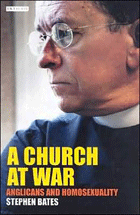 Get ready for that famous tongue-in-cheek wit
and understatement from our man from England, Tony Heyes, because in
this issue he reviews a hot-button-issue book: Get ready for that famous tongue-in-cheek wit
and understatement from our man from England, Tony Heyes, because in
this issue he reviews a hot-button-issue book:A Church at War: Anglicans and Homosexuality Contact |

A Church at War: Anglicans and Homosexuality
By Stephen Bates
Hardcover, 256 pages, $24.95
Published by I.B. Tauris 2004
ISBN 1 85043 480 8
In all Christian charity, God
hates fags.
It has been a good year for Gay Rights in Britain. The Civil Partnership Act has been passed, the right to adopt has been conceded to gay couples, pension rights for same sex partners are increasingly common and may soon become mandatory. Next year it becomes illegal to discriminate on the grounds of sexual orientation. In society at large gayness is becoming less of a handicap. There are gay cabinet ministers and MPs. Sir Ian McKellen is appearing as Widow Twanky, Aladdin’s mother, at the Old Vic Theatre – a change from Gandalf – and uttering such immortal lines as “I bought this dress for a ridiculous figure”. Rupert Everett and Simon Callow have appeared in detective stories on television, a gay comedian is hosting a chat show at peak time, there are gay presenters on every channel and the winner of the first Pop Idol competition was an out gay man.
Given this increasing level of tolerance, it is puzzling to see the Anglican Church, the State Church, getting its knickers in a twist over the issue. It is, perhaps, something of a paradox that although there is a State Church, of which the Queen is the Supreme Governor, religion plays so little a part in politics. Any politician who tried to drag God into his speeches would be regarded as a sanctimonious humbug, a hypocrite. This is perhaps a function of the British attitude to religion in general. Any kind of religious enthusiasm is generally regarded with distaste, an indication of a lack of a proper sense of proportion. The level of churchgoing in 1999 was seven per cent and is still falling. Approximately four per cent of Anglicans attend church. It would be reasonable to assume that such poor attendance figures and the redundancy of so many historic churches would be the churches’ prime concern but no; homosexuality tops the agenda. This is even more bizarre when one considers that the churches have a proportionately higher number of gay people among the clergy and ministers than are found in the population at large.
Stephen Bates’ book, A Church at War, explores how the church has managed to bring itself to this impasse. Things came to a head in England when a gay man, Jeffrey John, was nominated for the bishopric of Reading. He admitted to having a lifelong partner but said that their relationship had been celibate for a long time. According to the Anglican Church’s teaching, therefore, he was eligible for the post. A furore, stoked by fundamentalist evangelicals, ensued and although the Archbishop of Canterbury initially gave his backing to the appointment he eventually prevailed upon Dr. John to withdraw his candidacy. Mr. Bates recounts the whole sorry saga. The Archbishop emerges with a tarnished reputation. He agreed to see Canon John only when the Canon’s partner threatened to tell the press he was refusing to see him. Clearly, like the Duke of Plaza-Toro, the Archbishop prefers to lead his regiment from behind; he finds it less exciting.
At about the same time a similar crisis erupted in the US with the appointment of Gene Robinson as Bishop of New Hampshire in the Anglican Church’s sister Church, the Episcopalian Church. The church authorities in the US were more robust in their support than their English counterparts and the appointment went ahead, though not without a similar level of protest.
Mr. Bates’ book is an account of the controversy surrounding these two appointments and an exploration of the issues that those involved claim to be fundamental. He has interviewed many of the protagonists and what an appalling picture many of them present! In religious wars charity is the first casualty. He concludes that the argument, as is usually the case in such matters, boils down to one of power and control. Those in authority seem, from time immemorial, to have felt obliged to tell the rest of us what to do. One is reminded of the countess on her wedding night who asked her husband, “Do the poor do this?”
“Yes, my dear.”
“Then tell them to stop. It’s too good for them.”
The most striking aspect of this exploration to emerge from Mr. Bates’ book is the sheer bone-headed anti-intellectualism of the Christian fundamentalists. It is as though the Enlightenment never happened. They seem to put their brains into suspended animation when discussing religious matters or the Bible. Creationists, for example, overlook the fact that the Book of Genesis is a conflation of two contradictory accounts of creation. Homophobes are extremely selective in their choice of biblical anathemas, ignoring the biblical injunctions against the rich, tattooing, adultery and shellfish. Christians generally have a peculiar view of the Gospel of Love. None of them can explain why the Bible should be taken seriously anyway. There is no evidence that it is the word of God as opposed to, for example, the Q’ran or the Ancient Egyptian Book of the Dead (from which many of the psalms seem to be derived). The past two centuries of biblical scholarship – higher criticism and textual analysis – seem to have passed them by. The pity of it all is that people eminent in fields outside theology and biblical scholarship should leave their critical faculties behind when considering such important matters. Surely God gave them brains to use them? Why should televangelists, and others clearly on the make and in the business of scapegoating, be deferred to by the population at large?
There seems no sensible answer to this!
All in all, this is an interesting if saddening book, providing much food for thought.